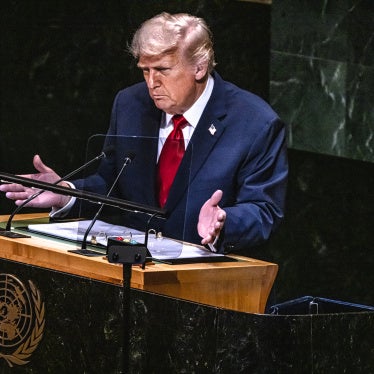The United States is set to defy its allies on another critical human rights treaty, warned Human Rights Watch as the United Nations debates a new treaty to prevent torture.
The U.N. Economic and Social Council (ECOSOC), the organization's governing body for human rights, will next week debate a draft Optional Protocol to the Convention Against Torture. The new treaty would establish an international system of inspection visits to places of detention, but would only apply to those countries that ratify it.
The current text has been put forward by Costa Rica and enjoys wide support from ECOSOC members, including members of the European Union and many Latin American, Caribbean and African states. But the United States has signaled its opposition and wants negotiations on the text re-opened.
“Yet again the Bush Administration is on a collision course with its allies over an important new mechanism to protect human rights,” said Rory Mungoven, Global Advocacy director for Human Rights Watch. “Last week, it was the International Criminal Court, this week, it's the prevention of torture.”
Human Rights Watch said the draft Optional Protocol represented the best compromise possible after ten years of difficult negotiations. It addressed many of the concerns previously raised by governments, including the United States.
The U.S. government has objected to the proposal, claiming that prison visits by an international body would be too intrusive. But the system of visits has many checks and balances, ensuring consultation with governments, prior-notification of visits and the confidentiality of reports. It can be adapted to different legal cultures, including federal systems. And if the U.S. government didn´t ratify the new treaty, it would not face any inspections at all.
Human Rights Watch warned that the U.S. proposal to re-open negotiations on the draft would be the kiss-of-death for the treaty. Abusive governments, many of which have not even signed the Convention Against Torture, would use further negotiations to water down or block the adoption of the protocol.
“By sending this treaty for more negotiations, the United States would be playing into the hands of countries such as Cuba and Iran, which want to block international scrutiny of human rights,” Mungoven said.
Human Rights Watch said the U.S. government should not oppose or delay adoption of the protocol, even if it chose not to ratify the treaty itself





